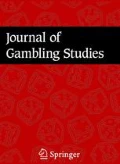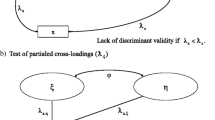Abstract
Research on gambling has the double mandate of public service and the advancement of science. This paper is meant to carry forward that mandate. Latent in research on the causes of problem gambling is the policy insight that these causes represent different types of phenomena and are unequally mutable to practitioners' efforts to prevent and/or treat problem gambling. By making the issue of mutability manifest in research, findings from research would have more policy relevance and practical import. Data from a 1989 Iowa survey on lottery play and problem gambling are analyzed to illustrate this point. 1,226 respondents were contacted by phone and phone interviews were completed with 1,011 of these 1,226 eligible respondents. With multiple regression, we assessed the contributions of mutable and immutable variables to the explained variance in problem gambling. The results show mutable correlates explain enough variance in problem gambling to recommend their consideration in treatment/prevention. The results also suggest a social as well as a psychological etiology to problem gambling. Future research should, however, do a more complete comparison of social and psychological causes of problem gambling.
Similar content being viewed by others
References
Abt, V., Smith, J.F. & Christiansen, F.M. (1985).The business of risk: Commercial gambling in mainstream America. Lawrence, KS: University of Kansas Press.
American Psychiatric Association (1980).Diagnostic and statistical manual of mental disorders. Third Edition. Washington, DC: Author.
American Psychiatric Association (1987).Diagnostic and statistical manual of mental disorders. Third Edition, revised. Washington, D.C.: Author.
Bergler, E. (1958).The psychology of gambling. London: Harrison.
Clotfelter, C.T. (1979). On the regressivity of state-operated numbers games.National Tax Journal, 32, 543–548.
Clotfelter, C.T. & Cook, P.J. (1989).Selling hope: State lotteries in America. Cambridge, MA: Harvard University Press.
Frey, J.H. (1984). Gambling: A sociological review.Annals, 474, 107–120.
Hraba, J. (1989).Report to Iowa Department of Human Services: Research on The Iowa Lottery and Gambling. Ames, Iowa: Department of Sociology, Iowa State University.
Hraba, J., Mok, W. & Huff, D. (1990). Lottery play and problem gambling.Journal of Gambling Studies, 6, 355–377.
Jacobs, D. (1989). Illegal and undocumented: A review of teenage gambling and the plight of children of problem gamblers in America. In H.J. Shaffer, S.A. Stein, B. Gambino and T.N. Cummings (Eds.).Compulsive gambling: Theory, research, and practice. (pp. 249–291). Lexington, MA: Lexington Books.
Kallick, M., Suits, D., Dielman, T. & Hybels, J. (1979). Gambling participation. In M. Kallick, D. Suits, T. Dielman, and J. Hybels (Eds.).A survey of American gambling attitudes and behavior. (pp. 1–44). Ann Arbor, MI: Survey Research Center. Institute for Social Research.
Langer, E.J. (1983).The psychology of control. Beverly Hills: Sage Publications.
Lesieur, H.R. (1977).The chase: Career of the compulsive gambler. Garden City, N.Y.: Anchor.
Lesieur, H.R. (1979). The compulsive gambler's spiral of options and involvement.Psychiatry, 42, 79–87.
Lesieur, H.R. & Blume, S. (1987). The South Oaks Gambling Screen (SOGS): A new instrument for the identification of pathological gamblers.American Journal of Psychiatry, 114, 1184–1188.
Lieberman, L. (1988).A social typology of gambling behavior. NY: National Council in Compulsive Gambling.
Livernois, J. (1987). The redistributive effects of lotteries: Evidence from Canada.Public Finance Quarterly, 15, 339–351.
Mok, W. & Hraba, J. (1991). Age and gambling behavior: A declining and shifting pattern of participation.Journal of Gambling Studies, 7, 313–335.
Moran, E. (1975). Pathological gambling.Contemporary Psychiatry, British Journal of Psychiatry, Special Publication No. 9. London: Royal College of Psychiatrists.
Orford, J. (1985).Excessive appetites: A psychological view of additions. NY: John Wiley and Sons.
Rosecrance, J. (1986). Attributions and the origins of problems gambling.The Sociological Quarterly, 27, 463–477.
Sommers, I. (1988). Pathological gambling: Estimating prevalence and group characteristics.International Journal of the Addictions, 23, 477–490.
Spiro, M.H. (1974). On the incidence of the Pennsylvania Lottery.National Tax Journal, 27, 57–61.
Suits, D.B. (1977). Gambling taxes: Regressivity and Revenue Potential.National Tax Journal, 30, 19–35.
Transition Planning Associates (1985).A survey of pathological gamblers in the state of Ohio. Philadelphia, PA.
Vaillancourt, F. & Grignon, J. (1988). Canadian lotteries as taxes: Revenues and incidence.Canadian Tax Journal, 36, 369–388.
Volberg, R.A. & Steadman, H.J. (1988). Refining prevalence estimates of pathological gambling.American Journal of Psychiatry, 145, 502–505.
Wells, C. (1989). America's gambling fever: Everybody wants a piece of the action-but is it good for us?Business Week, 3102 (April 24), 112–120.
Winston, S. & Harris, H. (1984).Nation of gamblers. Englewood Cliffs, NJ: Prentice-Hall.
Author information
Authors and Affiliations
Additional information
This research was partially supported by the Iowa Department of Human Services and the National Institute of Mental Health (1 R01 MH50369-01A1). The authors wish to thank Willis Goudy, anonymous readers and the editor of this journal for helpful comments.
Rights and permissions
About this article
Cite this article
Hraba, J., Lee, G. Problem gambling and policy advice: The mutability and relative effects of structural, associational and attitudinal variables. J Gambling Stud 11, 105–121 (1995). https://doi.org/10.1007/BF02107110
Issue Date:
DOI: https://doi.org/10.1007/BF02107110




